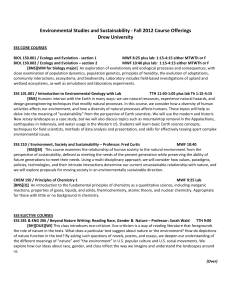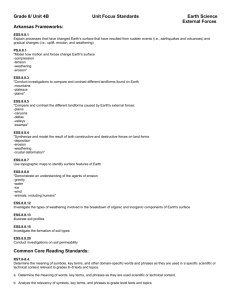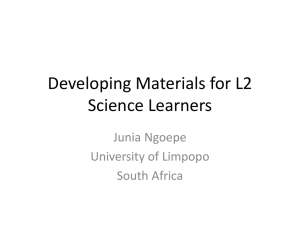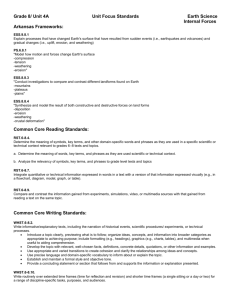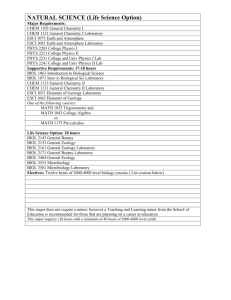Environmental Studies and Sustainability
advertisement
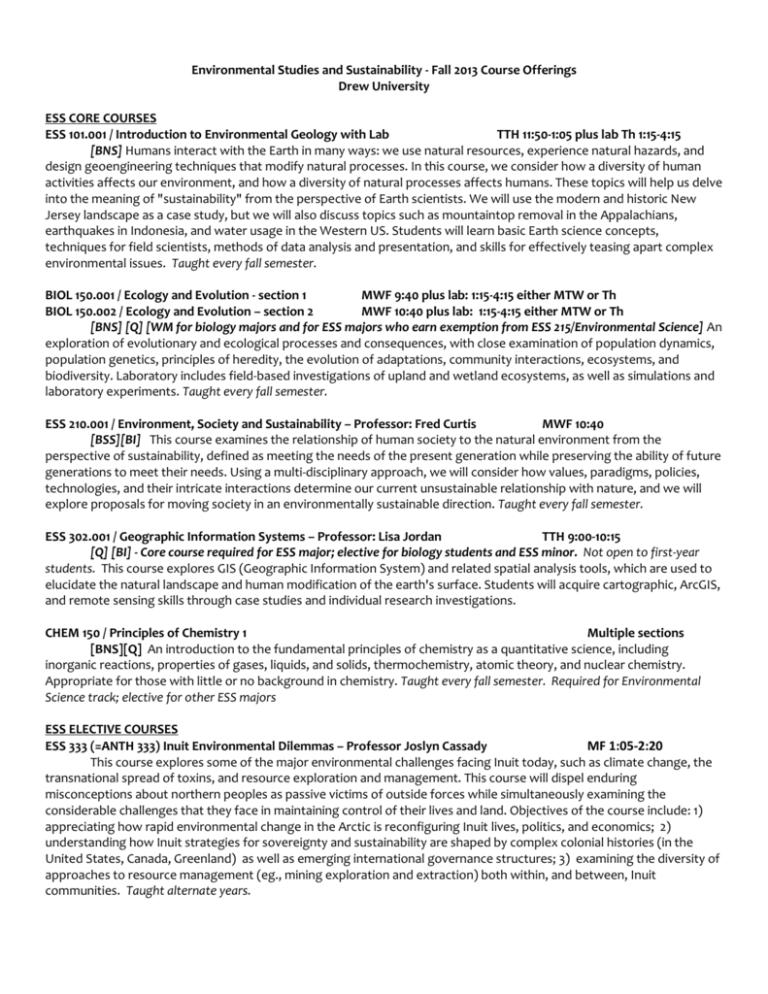
Environmental Studies and Sustainability - Fall 2013 Course Offerings Drew University ESS CORE COURSES ESS 101.001 / Introduction to Environmental Geology with Lab TTH 11:50-1:05 plus lab Th 1:15-4:15 [BNS] Humans interact with the Earth in many ways: we use natural resources, experience natural hazards, and design geoengineering techniques that modify natural processes. In this course, we consider how a diversity of human activities affects our environment, and how a diversity of natural processes affects humans. These topics will help us delve into the meaning of "sustainability" from the perspective of Earth scientists. We will use the modern and historic New Jersey landscape as a case study, but we will also discuss topics such as mountaintop removal in the Appalachians, earthquakes in Indonesia, and water usage in the Western US. Students will learn basic Earth science concepts, techniques for field scientists, methods of data analysis and presentation, and skills for effectively teasing apart complex environmental issues. Taught every fall semester. BIOL 150.001 / Ecology and Evolution - section 1 MWF 9:40 plus lab: 1:15-4:15 either MTW or Th BIOL 150.002 / Ecology and Evolution – section 2 MWF 10:40 plus lab: 1:15-4:15 either MTW or Th [BNS] [Q] [WM for biology majors and for ESS majors who earn exemption from ESS 215/Environmental Science] An exploration of evolutionary and ecological processes and consequences, with close examination of population dynamics, population genetics, principles of heredity, the evolution of adaptations, community interactions, ecosystems, and biodiversity. Laboratory includes field-based investigations of upland and wetland ecosystems, as well as simulations and laboratory experiments. Taught every fall semester. ESS 210.001 / Environment, Society and Sustainability – Professor: Fred Curtis MWF 10:40 [BSS][BI] This course examines the relationship of human society to the natural environment from the perspective of sustainability, defined as meeting the needs of the present generation while preserving the ability of future generations to meet their needs. Using a multi-disciplinary approach, we will consider how values, paradigms, policies, technologies, and their intricate interactions determine our current unsustainable relationship with nature, and we will explore proposals for moving society in an environmentally sustainable direction. Taught every fall semester. ESS 302.001 / Geographic Information Systems – Professor: Lisa Jordan TTH 9:00-10:15 [Q] [BI] - Core course required for ESS major; elective for biology students and ESS minor. Not open to first-year students. This course explores GIS (Geographic Information System) and related spatial analysis tools, which are used to elucidate the natural landscape and human modification of the earth's surface. Students will acquire cartographic, ArcGIS, and remote sensing skills through case studies and individual research investigations. CHEM 150 / Principles of Chemistry 1 Multiple sections [BNS][Q] An introduction to the fundamental principles of chemistry as a quantitative science, including inorganic reactions, properties of gases, liquids, and solids, thermochemistry, atomic theory, and nuclear chemistry. Appropriate for those with little or no background in chemistry. Taught every fall semester. Required for Environmental Science track; elective for other ESS majors ESS ELECTIVE COURSES ESS 333 (=ANTH 333) Inuit Environmental Dilemmas – Professor Joslyn Cassady MF 1:05-2:20 This course explores some of the major environmental challenges facing Inuit today, such as climate change, the transnational spread of toxins, and resource exploration and management. This course will dispel enduring misconceptions about northern peoples as passive victims of outside forces while simultaneously examining the considerable challenges that they face in maintaining control of their lives and land. Objectives of the course include: 1) appreciating how rapid environmental change in the Arctic is reconfiguring Inuit lives, politics, and economics; 2) understanding how Inuit strategies for sovereignty and sustainability are shaped by complex colonial histories (in the United States, Canada, Greenland) as well as emerging international governance structures; 3) examining the diversity of approaches to resource management (eg., mining exploration and extraction) both within, and between, Inuit communities. Taught alternate years. ECON 247 / Economics of Business & Sustainability – Professor Fred Curtis MWF 1:15 – 2:20 This course considers the environmental challenges facing business. It will examine business responses to environmental regulation, competitive advantages of "green" business, consumer demand for green products, product life cycle analysis, industrial ecology, environmental partnerships between business and non-governmental organizations, natural capitalism, and business education. Environmental decision-making of both large corporations and small businesses will be included in the course. The course will include case studies, outside speakers from the business community and student presentations. Prerequisite: ECON 5; Waived for ESS students. Not open to first year students. ESS 281 & ENG 206 / Food Justice and American Literature [BH][DUS][WI] MW 2:30-3:45 ESS 381 & 306 / Literature and the Environment [BI][DUS][WI] TTH 11:50-1:05 BIOL 318 / Freshwater Ecology - Professor Caroline Maier TTH 10:25-11:40 ; Lab T 1:15-4:15 An exploration of physical, chemical, and especially biological components of freshwater ecosystems. Considers lotic (moving water) systems, but emphasizes lentic (standing water) ecosystems. Laboratory concentrates on field and follow-up techniques for collecting and evaluating ecological information. Field work is centered on ponds within the campus arboretum, with field trips to other local freshwater habitats included. Fulfills laboratory requirement for major. Prerequisite: BIOL 150 and BIOL 160. Corequisite: BIOL 318L (lab). Taught fall semester. BIOL 324/Forest Ecology – Professor Sara Webb MWF 8:25-9:15; lab W 1:15-4:15 The study of the structure, composition, and dynamics of forest communities. Topics include succession, paleoecology, biotic interactions, and threats to forest integrity. Laboratory emphasizes methods of vegetation sampling and analysis of ecological data, through intensive study of the campus forest preserve and through field trips to diverse forest types. Prerequisite: BIOL 150 or ESS 215. Corequisite: BIOL 324L (lab). Taught alternate fall semesters. BIOL 338/Ornithology – Professor Tammy Windfelder TTH 8:15 – 9:15; Lab T 1:15 – 4:15 An advanced course for biology majors interested in the biology of birds. Topics include: anatomy, physiology, distribution and systematics, with emphasis on avian ecology, behavior, and evolution. Through integrated laboratories, field trips, and discussions of the primary literature, students learn the identification of birds, functional morphology, and research techniques such as experimental design, behavioral observation, and statistical analyses. Two weekend field trips. Prerequisite: BIOL 7 and BIOL 9. Co-requisite BIOL 338L (lab). Taught alternate fall semesters. ANTH 304.001 = ARTLT 301 sec.3/ Topics: History, Culture, and the Environment –Professor Marc Boglioli T 4-6:30 p.m. [BS] This course focuses on the ways that different groups of people conceptualize and engage their physical environments. It is a deeply cross-cultural course that will examine and compare various models of human-environment relations. This is also an explicitly interdisciplinary course, drawing from anthropology, environmental history, historical ecology, sociology, and nature-oriented fiction and non-fiction. In an effort to make direct applications to contemporary environmental debates we will consider a host of “hot-button” environmental issues, including endangered species protection, invasive species, environmental justice, indigenous sovereignty, energy development, wildlife management, and cultural resource management. As of 4/2/13
